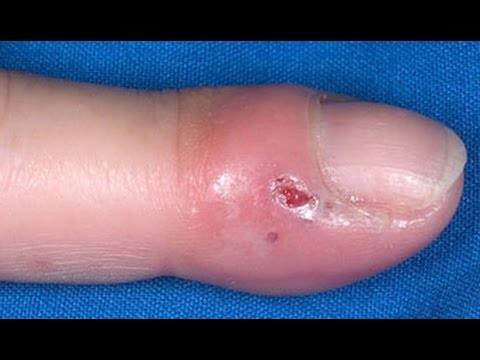A herpetic whitlow, or whitlow finger, is an abscess of the end of the finger caused by infection with the herpes simplex virus (the “cold sore virus”).
It usually affects the fleshy area of the fingertip.
What are the symptoms?
The fingertip suddenly becomes red, swollen and extremely painful.
Small white blisters develop underneath the skin of the finger, which may break to release fluid, eventually crusting over.
What’s the cause?
There are two types of herpes simplex virus (HSV), type 1 and type 2.
Both HSV-1 and HSV-2 can cause a herpetic whitlow. These viruses can also cause cold sores and genital herpes.
A herpetic whitlow can develop as a secondary infection if you already have a cold sore or genital herpes and you touch the sore area of skin, transferring the virus from your mouth or genitals to your finger.
It can also develop if you touch the sore or blister of another infected person.
You’re at greater risk of becoming infected if you have a weakened immune system.
How is it treated?
Antivirals
A herpetic whitlow may be treated with an antiviral drug such as aciclovir.
You may be prescribed a five or seven day course of 200mg aciclovir to take five times a day or 400mg to take three times a day.
But this is only worth taking if you start the treatment within 48 hours of symptoms starting. Using an antiviral after this initial period is unlikely to have any effect.
Antiviral drugs may help to heal a herpetic whitlow, but they do not get rid of the herpes simplex virus or prevent future outbreaks of herpes simplex viral infection.
A whitlow will heal without an antiviral drug within two to three weeks. Antiviral treatment may:
reduce the time taken for the abscess to heal
reduce your risk of a secondary bacterial infection
reduce your risk of the herpes simplex virus spreading to other parts of the body
Caring for the whitlow at home
You should cover the whitlow with a light dressing so the infection doesn’t spread any further.
Avoid wearing contact lenses until the infection has healed, to stop the virus spreading to your eyes.
You can take an over-the-counter painkiller such as paracetamol or ibuprofen for pain relief.
Do not attempt to drain the fluid, as this may cause the virus to spread or cause a bacterial infection.
Will it come back?
The herpes virus remains dormant (inactive) in nerve cells and may reactivate at a later date, sometimes following stress or an illness. This can result in another whitlow at the same site as the first one
If a whitlow does return, it can be treated in the same way, with an antiviral drug.
If the whitlow returns often, the antiviral drug can be given for long periods of time (years) to reduce the number of times it comes back. This suppressive antiviral treatment will also reduce both the severity of the whitlow and the length of time it takes to heal.
